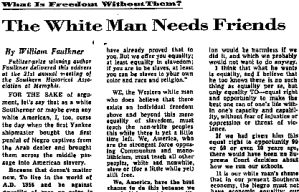 As I write about at length in The Eyes of Willie McGee, William Faulkner signed off on a public statement about McGee in 1951, in which he said he thought McGee was innocent of the rape charge leveled against him and should be freed. That caused a few problems—the D.A. in the case, Paul Swartzfager, called the comments “so untrue as to make the blood of any red-blooded American boil”—so Faulkner retreated a bit and said no more.
As I write about at length in The Eyes of Willie McGee, William Faulkner signed off on a public statement about McGee in 1951, in which he said he thought McGee was innocent of the rape charge leveled against him and should be freed. That caused a few problems—the D.A. in the case, Paul Swartzfager, called the comments “so untrue as to make the blood of any red-blooded American boil”—so Faulkner retreated a bit and said no more.
There were other times when Faulkner opined about race, politics, or current events—and soon wished he hadn’t. The most famous happened in 1956, when he gave an interview to a newsmagazine called The Reporter. Asked about then-current attempts to integrate the University of Alabama, Faulkner said the federal government needed to keep a foot off the pedal on this issue or somebody would wind up getting killed. He wanted integration to happen, but at a slower pace set by the South. Moving too fast would lead to violence, he said, adding, “[I]f it came to fighting I’d fight for Mississippi against the United States, even it meant going into the street and shooting Negroes.” As if that weren’t enough to get the shouting started, he continued like so: “I will go on saying that the Southerners are wrong and that their position is untenable, but if I have to make the same choice that Robert E. Lee made then I’ll make it.”
The uproar over that—which Faulkner tried to dodge by insisting he’d been “grossly misquoted”—drowned out other aspects of this interview that were quite fascinating. Faulkner offered a tart analysis of Mississippi’s education crisis (he said all the schools were lousy), opined that the average black workingman was fundamentally smarter than his white counterpart, said racism was a management-labor tool (designed by upper-class whites to keep lower-class whites panting and huffing about something other than their own economic exploitation), and predicted that white and black would merge into a single mocha-colored race within 300 years.
As for his allegation that he’d been misquoted . . . probably not. The interviewer—a New York-based correspondent for the London Sunday Times named Russell Warren Howe—responded in print and sounded convincing. “All the statements attributed to Mr. Faulkner were transcribed by me from verbatim shorthand notes of the interview,” he wrote in The Reporter. “If the more Dixiecratic remarks misconstrue his thoughts, I, as an admirer or Mr. Faulkner’s, am glad to know it. But what I set down is what he said.”
For more on this turbulent period in the life of Mr. Bill, check out this excellent paper by Louis Daniel Brodsky, which makes use of 43 unpublished letters addressed to Faulkner during these months, some of them touching on the Howe interview. Not shockingly, Brodsky believes that the root cause of Faulkner’s foot-in-mouth problem with Howe was simple: He was drunk.

Hi Alex:
As a Faulkner fan, I find this really interesting as I’ve found all the other blog entries. No kidding, this is a good blog and I hate blogs, generally. One funny Faulkner incident re: Bill’s drinking. The mother of an old girlfriend, member of an old-line TN/MS family, attended a wedding and was seated next to Faulkner at the reception because, as she later discovered, she was very pretty. Unsure what to ay to the great man, she said little and he said almost nothing until, well into his cups, he turned to her and said “You have wonderful bone structure.”